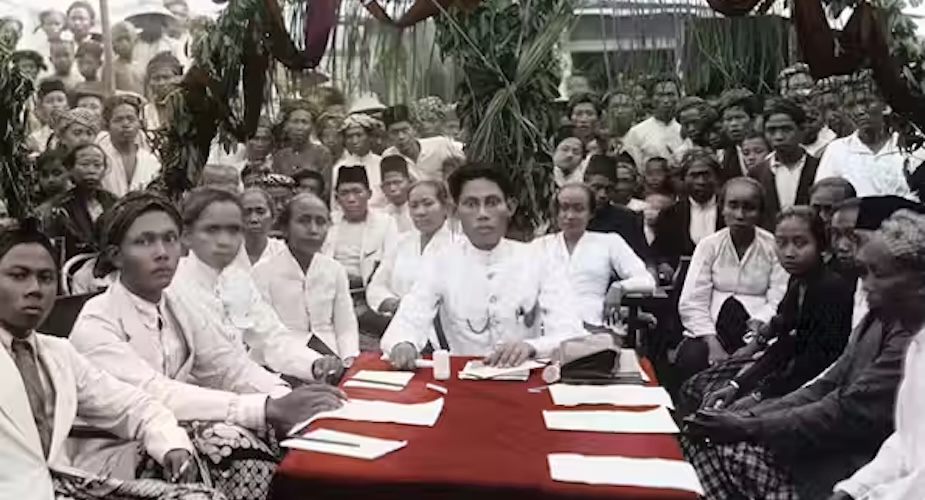Authorities blame the recent Jakarta riots on the coalition PRD. It has hundreds of members, but military leaders liken it to the PKI of the 1960s, which had millions. Who are these 1990s activists? VANNESSA HEARMAN visited with one of the coalition partners earlier this year, and filed this inside story.
Authorities blame the recent Jakarta riots on the coalition PRD. It has hundreds of members, but military leaders liken it to the PKI of the 1960s, which had millions. Who are these 1990s activists?
Vanessa Hearman
It was an ordinary Wednesday afternoon in a dusty little lane in Tebet, South Jakarta. The children were playing with toy guns on the edge of an empty lot. There were few signs indicating what was to happen the next day. That next day, 7 December 1995, marked the twentieth anniversary of the invasion of East Timor by Indonesia.
Indonesians would wake to the news that 116 Timorese and Indonesian students, the latter under the banner of Smid, had scaled the fences of the Russian and Dutch embassies and were occupying them to draw attention to the plight of the Timorese. The occupation lasted for three days and was a first for such a high profile joint Indonesian-Timorese action.
Thongs
Opposite the empty lot was a house, that locals would tell you was frequented by students. Outside lay pairs and pairs of thongs and shoes, testimony to its many and often transient inhabitants. Inside, there was no furniture to speak of, just a mat on the floor and bedding in each of the three rooms. Many meetings took place here, evident from the overflowing ashtray and pieces of paper scattered.
This meeting was more intense than others. It was to coordinate the next day's action. Smoke billowed in the air from many a fiercely smoked kretek, as each studied carefully the plan laid out on the white board by tomorrow's logistics person. There was expectancy in the air and unanswered questions of how to house the hundred or so activists coming from all over Java.
It was a tactical meeting worthy of a major battle. This was the home of Smid, Indonesia's rapidly growing student organisation, founded in 1992 by fewer than ten activists. Smid stands for Solidaritas Mahasiswa Indonesia untuk Demokrasi - Student Solidarity for Democracy in Indonesia. In 1995, it formed branches in Sumatra and Sulawesi, as well as in the main cities of Java.
Smid is a mass organisation of students affiliated to the PRD, the People's Democratic Party. The issues it takes up include students' rights, academic freedom and military intervention on campus. Operating in both private and state universities, its aim is to see a democratic, grassroots civil society in Indonesia.
Bare walls
The state of Smid's resources was immediately evident from the lack of furniture and the bare walls, coloured a mildewy brown from Ciliwung River's most recent flood. Their computer had broken down and the telephone bill went unpaid again. The man from the electricity company was waving a yellow card, every day closer to power cut-off. Meanwhile, the knock at the door could mean a raid by the military or police. Certainty seemed to be something that Smid activists left behind when they joined the organisation.
On this particular occasion, members had flocked into Jakarta from all over Java for the embassy occupations. There were activists from Solo and Yogyakarta recounting tales of their latest clashes with the police. They were experiences one would shudder at. Stories of encounters with batons, canes and police motorbikes. Others were amusing, of the struggle over a police megaphone, the policeman worrying over what his superior would say if he were to lose the megaphone to a protester.
Sago
People were now sitting all over the mats on the floor, cross-legged, munching on peanuts and cheap biscuits bought at the corner store. For some, it would be their only meal for the day. Food was always a perennial problem. During the last election campaign, Warsito and Dedi (not their real names) were given the task of putting up campaign posters all over their city in Central Java. Upon looking in the money box, they found they only had enough money for either glue or food, but not both. Faced with this dilemma, they bought sago flour, with which they made their glue and the rest became dinner.
There were many more stories like these. Smid has few resources. But with what it has, it somehow manages to carry out many protest actions, whether they be around the issues of land disputes among peasants, workers' rights or self-determination for East Timor. This has earned it the label of the most active and consistent student organisation among its peers.
Rumours circulated that Smid activists flew by plane for their actions in other cities, as one prominent Jakarta news weekly recently wrote. Many Smid members I saw that day in Tebet were fast asleep, resting after their long overland train and bus journeys. It definitely wasn't jetlag they were recovering from.
Newspaper
Some others were tired from pounding the pavement selling their publications to sympathisers to raise funds. Smid publishes a bi-monthly newspaper called Suara Massa, a mixture of reporting of PRD/Smid activities and analysis. This particular issue contained reports of the Great River Industries strike, a garment factory in the Tangerang area, West Java, where many designer label garments were produced. The strike had been organised by PPBI (Indonesian Centre for Working Class Struggle), a union also affiliated to the PRD. The front cover showed a mass of people, some 10 000 marching at the same strike.
ther publications include Galang and Tugas Kita published by the PRD, and Pacul by STN (National Peasants' Union), another of the PRD's mass organisations. The latter is distributed amongst farmers in Java and Sumatra. By now night was fast approaching and a slow, smog-ridden dusk descended over Tebet. As the muezzin at the local mosque called out for prayer time, some got up to wash and then unrolled their prayer mats to pray.
Warm water
Last minute coordinating meetings with the Timorese took place at secret locations across Jakarta. The money box was sought and coins counted carefully, matched with the number of heads to feed. There were approximately forty of us altogether. Two people volunteered to go and buy food, parcels of rice and vegetables, accompanied by a poor people's version of bottled spring water, warm boiled water in a plastic bag.
We sat on the mats in a big circle and ate with our fingers. It was communal eating at its best. At the same time, they were preoccupied with what the next day would mean for themselves and for the movement in general. How long would they hold out? What sort of treatment would they be subjected to? There was excitement in the air, preparing for 4 am the next morning when they would be woken up to begin travelling to Jakarta's embassy row.
After that night, I did not see them again till weeks later and till the events of 7 December had been splashed on the front page of national dailies and reported internationally. I was moving on to witness the 6000-strong strike organised by PPBI at the Sritex textile mill in Solo, Central Java, to take place a few days after the beginning of the embassy occupations, and to meet more PRD activists.
With the recent political crackdowns on PRD and its associated mass organisations, the Tebet office has been raided at least three times. Since its lease had run out, the office was deserted each time.
Vannessa Hearman lives in Melbourne. She visited Indonesia last December and January.











